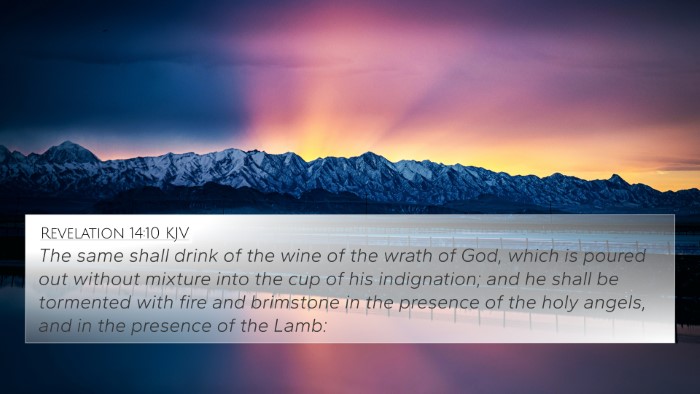Understanding Matthew 18:34
Matthew 18:34: "And his lord was wroth, and delivered him to the torturers, till he should pay all that was due unto him." This verse concludes the parable of the unforgiving servant, illustrating the dire consequences of failing to show mercy to others, even after being forgiven immense debts by God.
Summary of Insights
The interpretation of this verse draws from various public domain commentaries including those by Matthew Henry, Albert Barnes, and Adam Clarke. Here's a combined analysis:
Consequences of Unforgiveness
Matthew Henry emphasizes that the servant in this parable represents those who, after receiving grace, fail to extend that same grace to others. The lord’s wrath signifies God's displeasure with those who do not forgive, highlighting that forgiveness is a critical aspect of Christian faith.
God's Justice and Mercy
Albert Barnes explains that the act of delivering the servant to torturers illustrates the seriousness of sin and the resulting punitive measures when mercy is withheld. God's justice demands that we treat others as we wish to be treated, reinforcing the theme of reciprocal forgiveness.
Judgment Day Implications
Adam Clarke points out that the reference to “torturers” could symbolize spiritual torment, suggesting the eternal consequences of unforgiveness. This highlights a critical aspect of the Christian doctrine: the need for believers to engage in self-reflection and repentance to avoid judgement.
Key Themes
- Forgiveness: Central to the believer's relationship with God and others.
- Divine Justice: The balance between grace received and grace extended.
- Moral Responsibility: Each person is accountable for their actions towards others.
Cross-References Related to Matthew 18:34
- Matthew 6:14-15: "For if you forgive other people when they sin against you, your heavenly Father will also forgive you. But if you do not forgive others their sins, your Father will not forgive your sins."
- Luke 6:37: "Do not judge, and you will not be judged. Do not condemn, and you will not be condemned. Forgive, and you will be forgiven."
- Ephesians 4:32: "Be kind and compassionate to one another, forgiving each other, just as in Christ God forgave you."
- Colossians 3:13: "Bear with each other and forgive one another if any of you has a grievance against someone. Forgive as the Lord forgave you."
- James 2:13: "Because judgment without mercy will be shown to anyone who has not been merciful. Mercy triumphs over judgment!"
- Matthew 5:7: "Blessed are the merciful, for they will be shown mercy."
- Mark 11:25: "And when you stand praying, if you hold anything against anyone, forgive them, so that your Father in heaven may forgive you your sins."
Thematic Connections Between Bible Verses
This verse showcases the intricate connections between Bible verses regarding forgiveness and mercy. Understanding Matthew 18:34 involves looking at these themes through a broader scriptural lens:
Linking Bible Scriptures
By cross-referencing these verses, we identify a consistent message regarding the expectation of forgiveness. This parallelism enhances the reader's understanding and encourages a holistic view of Biblical teachings on mercy.
Tools for Bible Cross-Referencing
To delve deeper into themes such as these, utilizing a Bible concordance or a Bible cross-reference guide can facilitate more in-depth study. Techniques for cross-referencing Bible study can help believers explore scriptural ties and gain richer insights into their faith.
Conclusion
In conclusion, Matthew 18:34 serves as a sober reminder of the importance of forgiveness. The insights from respected commentaries, cross-referenced scriptures, and thematic connections offer a comprehensive understanding of this critical teaching in the Christian faith. Ultimately, it calls believers to reflect on their own willingness to forgive and to recognize the consequences of failing to do so.
Further Explorations
For those seeking to explore further, asking questions such as "What verses are related to Matthew 18:34?" or "How do Matthew 6:14-15 and Matthew 18:34 connect?" can lead to profound discoveries in one's spiritual journey.








